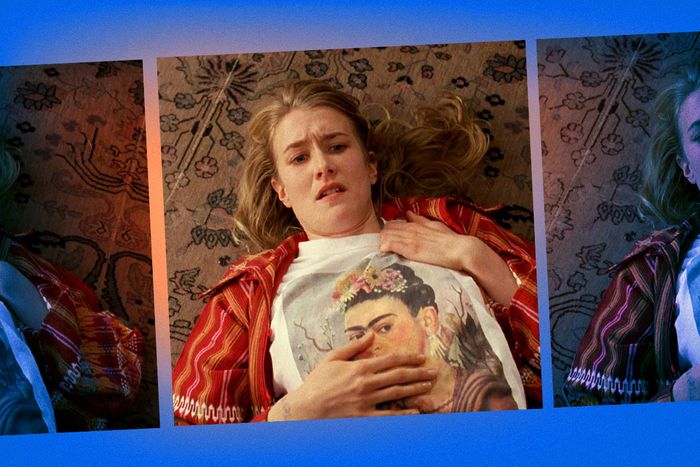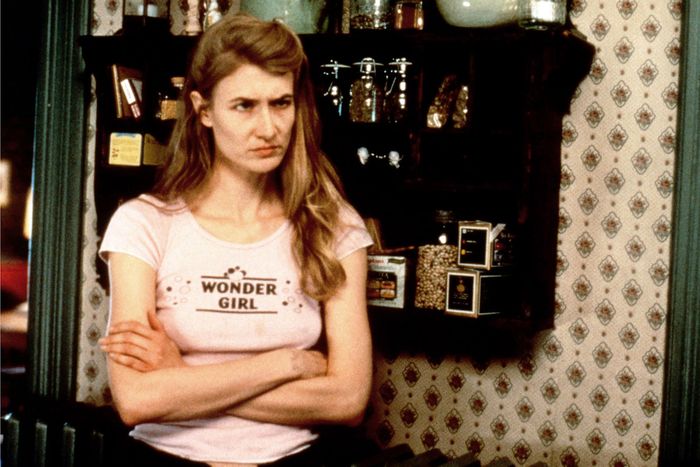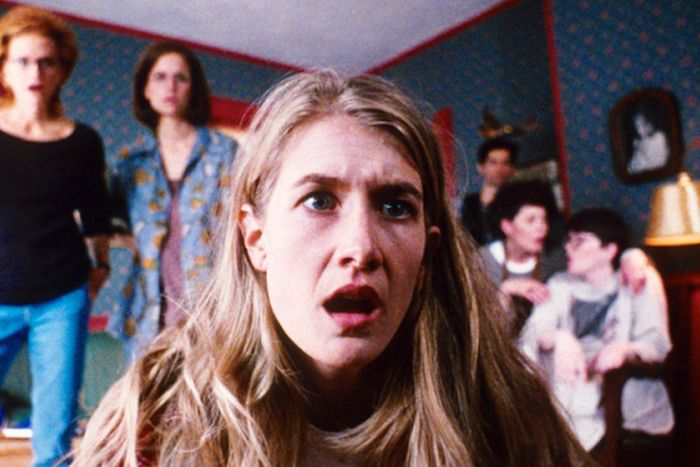
Citizen Ruth is about a paint-huffing vagrant who has been arrested 16 times and given birth to four children, all of whom were seized by the state. She possesses a reckless distaste for adult behavior, at one point telling a guy she slept with to “suck the shit out of my ass, you fucker!” When Ruth gets pregnant again and faces a felony charge for endangering the fetus, a judge offers her a reduced sentence if she has an abortion. That makes her the avatar for a frenzied tug-of-war between an evangelical anti-abortion group and pro-choice activists.
The film is also one of the funniest, most audacious American comedies ever made. Despite barely grossing any money upon its December 1996 release (more about Harvey Weinstein’s machinations later), it is a pivotal entry on Laura Dern’s résumé — arguably her best performance. As Ruth Stoops, Dern is an ungainly live wire, impetuous and agitated. Citizen Ruth marked the debut of Alexander Payne, who wrote the script with frequent collaborator Jim Taylor and quickly became one of Hollywood’s most respected indie directors thanks to Election, About Schmidt, and Sideways.
In honor of the movie’s 25th anniversary, and simply because it is an unimpeachable cult touchstone worth revisiting, Dern called up Vulture to talk about navigating her post–Jurassic Park career, embracing this “equal-opportunity offender” film, and why the recent Texas abortion ban lends Citizen Ruth fresh relevance.
Can you believe it has been 25 years since Citizen Ruth?
I actually can’t believe it, and I’m so happy to talk about it. I spent the afternoon yesterday with Alexander Payne, so it’s very easy to talk about because we have built a family off that movie.
Are the two of you working on something, or were you just getting together for the fun of it?
Just getting together, but as I’ve done before, I’ll do whatever. I walked down a street in Nebraska; I sat in a bathtub in Downsizing. He’s my family. We have remained so close. The actors on that movie; the production designer; the editor, who is one of my best friends — they’re all lovely.
When you look back at it, where were you in your life and career when Citizen Ruth first came around?
I was at a very lucky time in my career, being afforded lots of opportunities. At the time, I was making the choices as an actor that my parents raised me to make, which is Do what you feel in your gut, play the roles that speak to you, challenge yourself, be bold, be radical. I cared deeply, and still do, about human rights. Now, reflecting back, it’s almost like it’s my daughter, like, Yes! Go, girl. You were at a moment in your career where you’d just gotten your first Oscar nomination, and you were in the biggest movie in the world and getting all these franchise lead roles to go do, and you did Citizen Ruth and the coming-out episode for Ellen.
So you were being offered a lot of blockbusters after Jurassic Park?
Yeah, and that’s a dicey choice.
Are there any that you regret turning down?
No, but definitely big hits that were good movie-star roles for females. And a couple of them were wonderful, fun movies. But we thought this was an incredibly delicate and terrifying time for Roe v. Wade — but it was nothing compared to what it is now. I’m so grateful that you’re shedding light on this movie. I was just talking to the heads of Netflix. I was like, “Guys, where is Citizen Ruth? How do people find it?” I don’t know how people do find it. Is it on a streaming service?
I rented it on Apple when I rewatched it a few weeks ago. It’s interesting to hear you reflect on this. As you mentioned, you got your first Oscar nomination in 1991 for Rambling Rose. In 1993, you had big hits in Jurassic Park and A Perfect World. But then you didn’t appear in another movie until Citizen Ruth three years later. Was that intentional?
Well, I’m trying to reflect back because to me it was back-to-back in terms of release and production. Jurassic Park was coming out when I got the call and read Citizen Ruth, so it definitely was the choice over other things. I think it was intentional to hold off and try to find the next movie I wanted to do. It was definitely intentional to turn down several things that were possibilities. I just didn’t want to do the same thing.
And you felt like the success of Jurassic Park had afforded you that liberty?
Yeah, and Wild at Heart came out right before Rambling Rose, so those three things were all within a couple years of each other — all incredibly different types of films, and that felt so good. I just wanted it to be equally radically different next.
Today we know of Payne as someone actors are excited to work with, but no one knew who he was when you were reading the Citizen Ruth script. What was your first interaction with him like?
First I read the script, and it was flawless. Every line I say in the movie is in the script; it’s not an ad-libbed movie. It was right there, and it was so radical and mean and vulnerable and the best example of an equal-opportunity-offender script I’d read. Then we had lunch together to talk about it. It was a match made in heaven. He was so inspiring. It was so clear he was a great filmmaker. I don’t know how you can know it, but you can know it somehow. He understood it so completely. And then I saw his short film that he made from UCLA grad school called The Passion of Martin. It’s amazing. His irreverence is insane, and there’s a scene in that movie that is so hysterical and uncomfortable and gross and wonderful and pitiful and all the things Alexander and Jim write about together.
Did he give you a sense at the time of why he thought of you as Ruth Stoops?
I have to give credit. I don’t know what he was thinking originally, but other people close to me — a couple of actor friends — read the script. They were going, “Oh my God, I don’t know who’s going to play this part. You should read it. You would love this part.” One actor who I love and admire said, “You’re the only person who should do this,” which is funny.
Who told you that?
I won’t say, but two really good friends — one specifically. I was really touched by it because it’s pretty radical. So I read it, and I think Miramax had reached out. I don’t know what Alexander’s feeling about it was, but luckily, he really saw the movie with me. I think he felt I was definitely someone who could be boundaryless. But I don’t know that anything would speak to me being this character, hopefully.
Right, hopefully not.
But we were both ready to go on the gambling side of the things and have the time of your life.
With Ruth, we’re talking about someone who makes a lot of bad decisions, someone who is incredibly destructive to herself and the people around her, someone who is a bit clueless and difficult. A character like that runs the risk of becoming alienating or annoying, and I’m curious how conscious you were of that. There’s something about Ruth that keeps us rooting for her even though we can’t justify some of her despicable behavior.
That’s why it was such an important role for me in my education as an actor. You have to be honest and have deep empathy for the character you’re playing, which was a big lesson from my dad. What I brought was my longing to understand her and my hope to be as honest in the heartbreak of what she was going through as I could, while Alexander was unrelenting in not trying to gain empathy because he just lets her be as much of a screwup as she is. I think that was a really lucky combination. If there was a director who was worried about her not being likable, it wouldn’t have worked. If there was an actor who just wanted to play a vicious person, it wouldn’t have worked. It takes that delicate balance of the truth, which is that people are complicated and mean and vicious and lonely and scared. She’s dumb, but she’s also fried her brain from huffing paint for the last three years. It’s an interesting balance even in playing someone who makes really stupid choices and is a bit brain-dead from the horror of her addiction but also has some street smarts and instincts about people. You just go through the whole journey of what her life is like. The costume designer, the production designer, the editor — we became family because we all loved Ruth together. She’s this pound-rescue dog. The way we throw people away is so heartbreaking, but there’s comedy in it, too, so you have to find that.
Speaking of which, the best line in the movie is you yelling out of the car, “Suck the shit out of my ass, you fucker!” How many times did you do that?
Maybe a few, just because we were shooting in traffic and having to get the turn of the car. The way the actor playing my whatever — I don’t want to even call him an ex — rips through the plastic is all so pitiful. And then Swoosie Kurtz’s expressions! It’s so fun. It made me laugh so hard. I’m thrilled you’re highlighting it because my daughter’s generation are big Planned Parenthood supporters and horrified by what’s happening in Texas right now, and they’ve found it recently. I’ve had some of her 16-to-18-year-old friends calling me going, “Oh my God, I’d never seen Citizen Ruth. It’s everything!” It’s fun that people who had never seen it are discovering it now. As an audience, I love it so much. I’m so entertained by it.
A lot of people have come to think of it as one of your best performances, if not your very best. And yet the movie was only released in a couple dozen theaters and didn’t even make $1 million at the time. At what point did you realize it had developed a cult following?
I don’t know that I had, honestly. I just think hopefully with time and the issue at hand and with Alexander’s body of work and my body of work, people will find it. And that’s great.
Were you disappointed it wasn’t a bigger hit?
At that time, Miramax was releasing it. They had released a film called Priest, and the Catholic Church went crazy. An abortion comedy was not the easiest follow-up.
So you think they got cold feet?
I don’t know if they got cold feet, but it was very controversial. It was written about and protested at theaters. I don’t know that we expected it to be a blockbuster — let’s put it that way. It was critically beloved, and that was awesome. Film festivals loved it, and my work was very supported. But in terms of theatergoing audiences, we knew it was going to be tricky. I don’t know if it was purposely hidden or if the timing couldn’t have been worse because of the people who were protesting and angry about Priest. That’s why I hope it comes into the world now. Now is the perfect time for this movie.
Payne has said he felt like Weinstein and Miramax didn’t market the movie sufficiently and didn’t make good on their promise to campaign for an Oscar nomination for you. Did you feel like there was a momentum around Citizen Ruth after the Sundance premiere that Weinstein and Miramax didn’t capitalize on?
Oh, they definitely did not capitalize. They did the opposite of that, for sure. And for sure it was an intentional choice.
And you think it was about the subject matter more than anything else?
I think we’ve all learned a lot since then about risk-taking and promises and bullying. All I can say is it was absolutely intentional to definitely kill that support — for me specifically and for the movie.
We don’t need to belabor this point, but did you have an amicable relationship with Weinstein and his camp?
I would say we came out of Sundance with a very impassioned PR team for the movie and very impassioned critics and a real drive to go everywhere with it. And from the highest level down, it was killed. For sure.
It speaks to the quality of the film and your work in it that it has found such a significant audience over the years.
Yeah. As people who loved something and put their hearts and souls into it and feel like it was killed, it feels wonderful that people find it now. On the retribution and karma tip, it feels exciting that it would be now on so many levels, as you can pick up on. Also, given what’s happening in Texas, if we can get the world to see it, that would be really exciting.
Do you think abortion as a topic is something Hollywood and pop culture at large has gotten better at tackling? Some movies have addressed it in recent years like Never Rarely Sometimes Always and Obvious Child.
I don’t think so. Those movies are examples: In the indie art world, they’re very embraced. But it’s not a topic we’ve seen in a mainstream movie. And just when we think we’re tackling race in America or a franchise is saying, “We’re going to have a diverse cast, and you can make money like that,” it speaks to why this movie would not have been supported and what kind of attack there was on it. It’s just really interesting what people have a lot of fear around, and this is an interesting taboo. You can tackle heroin addiction and a serial killer and sexual assault in the mainstream but not abortion. That’s why I’m particularly proud of it.
At some point, the movie was going to end with a postscript that said Ruth had moved to California and become a successful real-estate broker. That was also a Weinstein demand that Payne eventually dropped. Do you remember that?
Oh, yeah! I’d forgotten that.
What did you think of that? Part of what makes the ending memorable is the two factions are still warring and we don’t know what’s going to happen to her after she flees.
Exactly, and that no one even sees her, right? They’re so caught up in their own horror and opinions and judgment. She can just disappear anonymously. That shot, I think, worked so beautifully, so it became the ending. But again, I think bullies need to win. They need to be right. So if you fight for what you feel is right as a filmmaker or an actor, or if you’re opinionated and it’s not what everybody else wants, they might just, you know, throw your movie away. What I’m very impressed by is I’m opinionated and I’m strong-willed politically mixed with a first-time director who would be strong-willed as well, which is brave because so many people get their movies taken away from them or their endings recut or their titles changed. All of those things were in question. So the trade-off is you get to have the movie you want but then you don’t get the support to have a theatrical run.
That’s a concise way of breaking it down. On a hopefully lighter note, you got to work with Tippi Hedren, who starred in Marnie with your dad. What was she like?
It was amazing to be with Tippi and talk to her about the connection with Dad. And Melanie Griffith’s first movie was a movie called Smile with my dad, so we talked about Melanie. There were all these wonderful, beautiful connections. She’s hilarious and has such an amazing activist spirit. She’s a humanist and an animal-rights activist, and it was so perfect that she would play this spearhead for protective rights. I thought that was a fantastic choice of Alexander’s. She was so fun. It was an amazing cast. Mary Kay Place!
Yes, whom you’d worked with in Smooth Talk, another one of your best performances.
I love that movie.
Me too.
Also a first-time director, Joyce Chopra. Mary Kay has remained like family. It was so great to be with her again. And of course, my favorite cameo ever was that the mom who I’m screaming to in Citizen Ruth was my mother. She had come to visit me and hang out. It was going to be Mother’s Day. I had been there for nine weeks, and Alexander was like, “Hey, you want to come do something for fun?” Just the memory of Mom and I getting to say those lines together tickles me.
More From This Series
- Nicole Richie Answers Every Question We Have About Great News
- Diane Ladd Answers Every Question We Have About Wild at Heart
- Colin Hanks Answers Every Question We Have About Orange County






